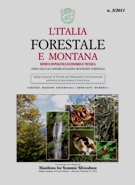Published
2011-06-30
Keywords
- systemic silviculture,
- complexity,
- forest management,
- command and control approach
Abstract
The first point of the “Manifesto for Systemic Silviculture” is examined. The concept of complex adaptive system is analyzed within the current scientific debate and theoretical and operational consequences in the field of silviculture and forest management are discussed. The “classic paradigm” in natural resource management has treated population, community and ecosystem dynamics as if they were functioning in a static environment following predictable trajectories. The last decades of the 20th century have seen the birth of hypotheses on ecosystem functioning that have evidenced that they are complex systems, characterized by nonlinear and unpredictable changes and modifications. Systemic silviculture and management, by considering the forest a complex and adaptive biological system, integrate these assumptions into analysis, methods and operational procedures which are coherent with this concept. With systemic silviculture, management proceeds following a coevolutionary continuum between human intervention and the system’s reaction. It is concluded that a cycle is over, that of the forest considered as an instrumental entity which can be managed according to predefined models to answer specific aims: history has clearly shown that over two centuries of efforts to make forest ecosystems predictable have transformed forests into plantations and silviculture into tree cultivation for wood production.


